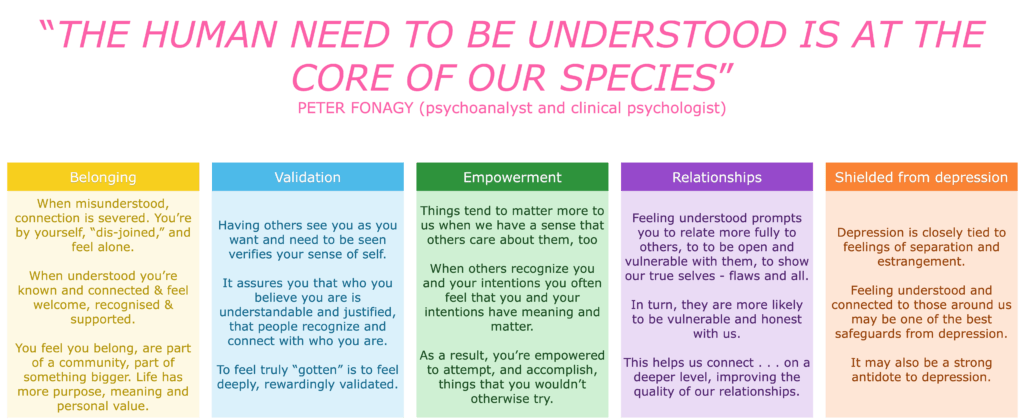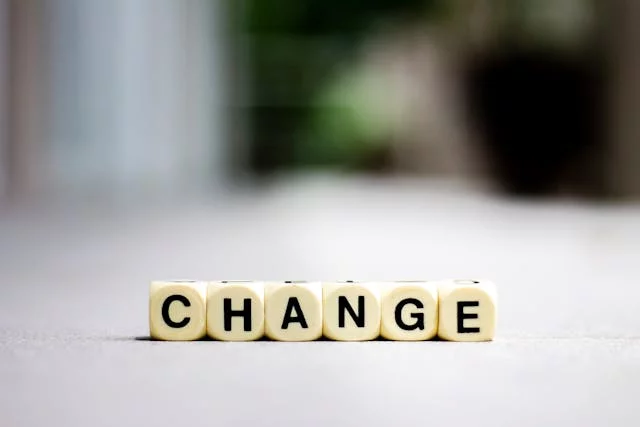The sense of feeling understood by other people can be very powerful, and can be a key starting point for improving our mental health and thriving in what we do. Summary by The World of Work Project
Being Understood
We were very struck by a comment by Peter Fonagy in a BBC radio 4 episode of The Life Scientific. In the programme he said: “The human need to be understood is as the core of our species”.
We found this simple statement evocative of all the moments where we have ourselves felt not understood, and those moments where we have felt understood. It captures the essence of our sense of the importance of human connection and our social nature as a species.
Building on our interest which was piqued in the above radio episode, we have explored this subject more to gain a better knowledge of how feeling understood affect people, and how this can affect our experiences in the workplace. It seems that being understood affects us in several powerful ways:

Belonging
Feeling understood increases an individual’s sense of belonging, of being in the in-group, of being part of the wider social shelter and connection of an accepting community. When understood we feel welcome, connected, recognised and supported.
Conversely, when we feel mis-understood we can feel that a connection is missing or even severed. Specific moments of misunderstanding can feel quite jarring. We can feel dis-joined, isolated and alone as a result of them.
Validation
When we feel seen and understood by others it can verify our sense of self, our sense of who we are and the validity of who we are. It’s reassuring and re-confirming that our sense making of the world is somehow reasonable, that others can see it too.
To feel truly “gotten” by someone often leads us to feel deeply and rewardingly validated
Empowerment
When we feel that others understand who we are, where we’re coming from and what matters for us, it can be very empowering.
We’re suddenly in a situation where our drives and motivations are understood by others, they’re reasonably, they may feel more worth fighting for or acting on, and this can feel liberating and empowering, like some of our self-doubt falls away.
Under these situations we’re more likely to take actions and try things we wouldn’t try if we didn’t feel understood by others.
Relationships
When we feel understood by others, when they understand who we really are, it can lead to open and trusting relationships in which we find it easier to be vulnerable and shape deep connections.
In turn, when we feel these deeper senses of connection and are vulnerable ourselves, it can make it easier for others to reciprocate, leading to a virtuous cycle of vulnerability, openness, understanding and trust.
Shielded from depression
There also seems to be evidence that feeling understood by others can shield us to some extent from depression.
Depression can at times be tied to feelings of separation and estrangement, and feeling understood by others can mitigate these feelings.
While we’re not experts in this area at all, it was certainly in relation to his own experience of seeking to overcome depression that Peter Fonagy spoke about the power of feeling understood in the radio episode we’ve linked to this post.
Why do we care about this in the world of work?
We think that when we can invest the time and effort to get to know and understand the people we work with, and show they that we understand them, that we’ll have stronger relationships, higher levels of wellbeing and higher levels of performance in our teams.
Learning More
This lovely BBC Radio 4 episode: “The Life Scientific – Peter Fonagy on a revolution in mental health care” says more about this topic than we could, and it’s what sparked our interest in this conecpt.
You might also enjoy this post on subjective wellbeing, or this one on the wheel of wellbeing.
Though not exactly aligned, we think the idea of humble inquiry is also relevant here, as is the idea of agape.
Lastly, you might also find this podcast on lonliness of interest:
The World of Work Project View
We don’t have too much to add to this beyond our own experiences and observations.
Reflecting on our own lives, we very much recognise that those moments where we feel that someone else “gets us” or understands us are hugely powerful and affirming.
Conversely, those moments where we feel that we see the world differently, or that we just are different to those around us and they don’t understand us, are really tough. They feel lonely, and separated, and isolated and limited. They can be draining and leave us feeling like we’re somehow wrong as beings, which is not pleasant.
We think that though it can sometimes be hard to find a connection and understanding of others, that it’s worth seeking for. We also find that our social tools like humble inquiry, empathy, engaged listening and adopting an open mindset can help us find these connections.
How We Help Organizations
We provide leadership development programmes and consulting services to clients around the world to help them become high performing organizations that are great places to work. We receive great feedback, build meaningful and lasting relationships and provide reduced cost services where price is a barrier.
Learning more about who we are and what we do it easy: To hear from us, please join our mailing list. To ask about how we can help you or your organization, please contact us. To explore topics we care about, listen to our podcast. To attend a free seminar, please check out our eventbrite page.
We’re also considering creating a community for people interested in improving the world of work. If you’d like to be part of it, please contact us.
Sources and Feedback
See the BBC Radio 4 episode link in the “learning more” section above, and this article for more details: https://www.psychologytoday.com/gb/blog/evolution-the-self/201706/feeling-understood-even-more-important-feeling-loved
We’re a small organization who know we make mistakes and want to improve them. Please contact us with any feedback you have on this post. We’ll usually reply within 72 hours.






